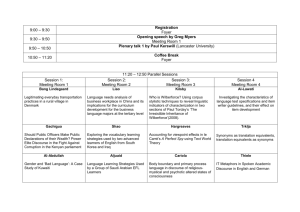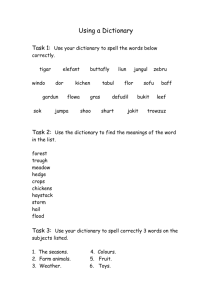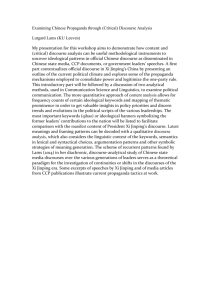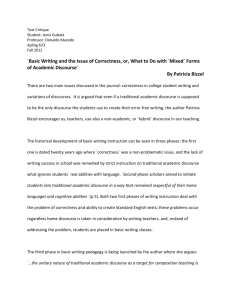March workshop report
advertisement
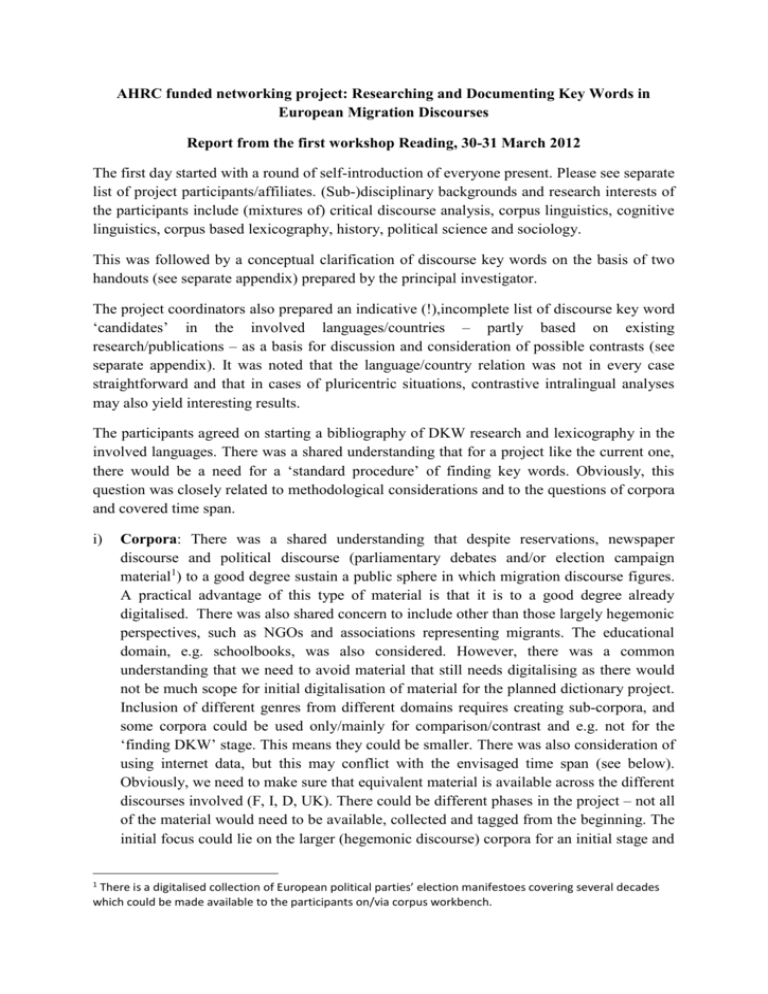
AHRC funded networking project: Researching and Documenting Key Words in European Migration Discourses Report from the first workshop Reading, 30-31 March 2012 The first day started with a round of self-introduction of everyone present. Please see separate list of project participants/affiliates. (Sub-)disciplinary backgrounds and research interests of the participants include (mixtures of) critical discourse analysis, corpus linguistics, cognitive linguistics, corpus based lexicography, history, political science and sociology. This was followed by a conceptual clarification of discourse key words on the basis of two handouts (see separate appendix) prepared by the principal investigator. The project coordinators also prepared an indicative (!),incomplete list of discourse key word ‘candidates’ in the involved languages/countries – partly based on existing research/publications – as a basis for discussion and consideration of possible contrasts (see separate appendix). It was noted that the language/country relation was not in every case straightforward and that in cases of pluricentric situations, contrastive intralingual analyses may also yield interesting results. The participants agreed on starting a bibliography of DKW research and lexicography in the involved languages. There was a shared understanding that for a project like the current one, there would be a need for a ‘standard procedure’ of finding key words. Obviously, this question was closely related to methodological considerations and to the questions of corpora and covered time span. i) 1 Corpora: There was a shared understanding that despite reservations, newspaper discourse and political discourse (parliamentary debates and/or election campaign material1) to a good degree sustain a public sphere in which migration discourse figures. A practical advantage of this type of material is that it is to a good degree already digitalised. There was also shared concern to include other than those largely hegemonic perspectives, such as NGOs and associations representing migrants. The educational domain, e.g. schoolbooks, was also considered. However, there was a common understanding that we need to avoid material that still needs digitalising as there would not be much scope for initial digitalisation of material for the planned dictionary project. Inclusion of different genres from different domains requires creating sub-corpora, and some corpora could be used only/mainly for comparison/contrast and e.g. not for the ‘finding DKW’ stage. This means they could be smaller. There was also consideration of using internet data, but this may conflict with the envisaged time span (see below). Obviously, we need to make sure that equivalent material is available across the different discourses involved (F, I, D, UK). There could be different phases in the project – not all of the material would need to be available, collected and tagged from the beginning. The initial focus could lie on the larger (hegemonic discourse) corpora for an initial stage and There is a digitalised collection of European political parties’ election manifestoes covering several decades which could be made available to the participants on/via corpus workbench. parallel to that we could develop smaller sub-corpora and add layers of (contrastive) analyses and add layers of information in the DKW dictionary entries step by step. As soon as we have agreed on the information that an individual entry in such a DKW dictionary should contain (2nd workshop in June) and as soon as there is a clear and binding template structure for all entries, this could be filled successively, and not every entry has to be completed in one go. ii) Time span: In the discourses involved, the discussions about periodisation showed that around 1990 could be a good caesura across the involved countries/languages. It was felt it would be unrealistic to aim to cover more than 2 decades (+ digitalisation problems). We can expect more and more digitalised material to be available from the early nineties onwards. It was also felt that not in every country the start year needs to be exactly the same one as long as the differences were only a couple of years. This would enable us to include not only the set of DKWs and their discourse determined meanings in, say, 2012 and 2013, but also show how ensembles of DKW in discourses shift, emerge and change discourse position (more central/marginal, change their relation to other DKWs) or change meaning in changing discourses or even lose their DKW salience. This would be part of the value of such a dictionary as this way, it would include more information about the involved migration discourses and yield insights into the dynamics of public discourse. iii) Methodology: There was a shared view that the dictionary should be corpus based, and that corpus analytical methodology was highly desirable. This was referred to mostly in terms of frequency and collocations although it was noted it remained unclear how exactly collocations would be used for analysis. It was also noted that frequency may not be the only indicator for DKWs but that salience and resonance may also point to DKWs not at the top of frequency lists. Modality, valency and negation were mentioned as useful indicators for deeper semantic analyses. Tagging requirements would need to be discussed, particularly the possibility of semantic tagging and detection of metaphorical conceptualisation. The procedure for growing a corpus of text from the larger corpora that pertain to migration discourse, and also for compiling valid, data-based lists of DKW could be a mixture of corpus driven and corpus based procedure: One could start with a few obvious, central DKW (such as ‘migration’, ‘immigrants’, ‘multicultural’, ‘integration’) and look at their collocates and in a kind of snowball system add to the list of DKW on the basis of findings from the corpora and in turn conduct searches to add texts in which they occur. It would be desirable to supplement this procedure with an approach based on frames/cognitive models. In any case, participants felt more comfortable to check, supplement or moderate this procedure with discourse expertise in order to assess the relevance of the findings, in an attempt to balance data frequency and discourse salience if we suspect this may not always be concurrent. There were other wishes like more of a diachronic perspective, or identifying key texts in the corpora, using them for additional analyses. Where this may be difficult to integrate into the work on the dictionary as such, pursuing interests like these could be other outcomes from the project. We could consider making additional outcomes or activities on the basis of the generated corpora part of the grant application and not every discourse-related team (F, UK, I, D) would need to do the same added research activities. Consistency is needed most of all for the work on the dictionary, not necessarily for added related research that branches out from the project. The discussion about (a combination of) possible methodological approaches will be furthered by a number of illustrative sample analyses of a DKW by a number of volunteering participants (most of all regarding corpus and/or cognitive approaches). These will be made available before the next workshop to the PI for her to create a synopsis for the respective slot in the second workshop (see attached revised schedule). iv) There was also a shared understanding of DKWs not only as nodes in the semantic networks of discourses as purely textual phenomena, but that they in some way correspond to cognitive conceptualisations; and that e.g. patterns of collocations and relations between DKW in discourses would tell us something about the cognitive conceptualisation of migrants and migration. It was agreed that it would be ideal to find a way in which the dictionary can pay respect to this. Rather importantly, it also means that we would not put lexicalisation, but conceptualisation first, and understand DKWs as lexicalisation of concepts, which may look different across the languages/discourses. We would then also avoid having to find corresponding formal entities (like integration, integrazione, Integration and intégration). This would also be misleading since this project makes most sense when we can show that even formal equivalents exhibit differences in their discourse determined semantics, different discourse positions and different degrees of contestation (e.g. ‘integration’ more contested in France than in Germany, less central in the UK than in Germany). We could look for/point out conceptual and functional rather than formal equivalents since lexicalisation may occur in different/changing ways. Therefore a digital, not printed, online dictionary presented in a (changing, i.e. re-building itself depending on what gets clicked) network structure would do more justice to an understanding of DKW as cognitive conceptualisations built through their usage in discourses than a linear organisation. However, there must be access to a ‘proper’ dictionary entry, too and a possibility for users to gain an overview over the individual entries in the different languages. The dictionary entries would not have to be one long text, but the information could be organised in clickable tabs. As a result of the discussion, the schedule for the second workshop was amended; if we try to use a flexible dictionary structure in order to emphasise the role of DKW as nodes in the semantic networks of discourses, and also their relation to cognitive conceptualisation, then there is not much need to try and fix an overall dictionary structure at the next workshop but rather to think about the technical/software requirements for a more flexible structure. The discussion should focus more on the purpose of the dictionary and accordingly the information that needs to be included in individual entries, i.e. how these entries could be structured. There will also be a brief demonstration about what such a structure could look like in electronic, corpus based lexicographical practice.



